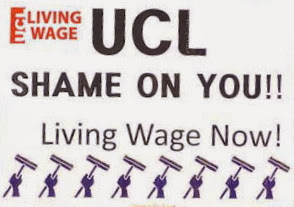The campaign in the press and pictures:
London colleges and the living wage
14 October 2009: The Chair of Camden Trades Council, George Binette, authors a letter in the Guardian about the contradiction between UCL's perceived academic excellence and its treatment of cleaners and other staff.
"As elsewhere in London, the workforce consists largely of migrant workers, with a large proportion paid the minimum wage of £5.80 an hour – £1.80 less than the most recent estimate of £7.60 for the London living wage. In early September, UCL's cleaning contractor, O&G, summarily dismissed one of its employees, Juan Carlos Piedra Benitez, who has been active in its Justice for Cleaners campaign. He believes he was sacked for his trade union activities."
"As elsewhere in London, the workforce consists largely of migrant workers, with a large proportion paid the minimum wage of £5.80 an hour – £1.80 less than the most recent estimate of £7.60 for the London living wage. In early September, UCL's cleaning contractor, O&G, summarily dismissed one of its employees, Juan Carlos Piedra Benitez, who has been active in its Justice for Cleaners campaign. He believes he was sacked for his trade union activities."
Staff And Students Protest Against Outsourcing Injustice [incl VIDEO]
26 May 2011: When UCL continued its outsourcing drive in 2011, the UCL Living Wage Campaign teamed up with Bloomsbury Fightback to protest further privatisation and degradation of conditions.
 "During a well attended rally in the quad one cleaner, who has worked
at
UCL for 26 years, spoke of her anger at a management team who have only a
few years collective experience. Unison representatives emphasised that
though this may be an attack on cleaners and security staff today,
management have implied that their plans extend to all support staff,
and that the fight against privatisation and for job security is a fight
for all university workers. Student speakers spoke of the gross
attitude of management towards the use of their finances, and the
precarity of the job market for future graduates as much as for current
support staff."
"During a well attended rally in the quad one cleaner, who has worked
at
UCL for 26 years, spoke of her anger at a management team who have only a
few years collective experience. Unison representatives emphasised that
though this may be an attack on cleaners and security staff today,
management have implied that their plans extend to all support staff,
and that the fight against privatisation and for job security is a fight
for all university workers. Student speakers spoke of the gross
attitude of management towards the use of their finances, and the
precarity of the job market for future graduates as much as for current
support staff."Bloomsbury Fightback video against the outsourcing:
Update on the London Living Wage from the UCL Provost, Professor Grant
15 November 2011: UCLU's Education & Campaigns Officer gives an update on discussions with UCL Management about the implementation of the LLW.
"I have had a meeting with the UCL Estates team, and
with Professor Grant himself. In both meetings, I was told that UCL was
honouring its commitment, and that they are in line with other
employers. However, Birkbeck and SOAS implemented the LLW within a year;
the Living Wage Foundation suggests that staff should be paid the LLW within 6 months of the change in the LLW.
There was no acknowledgement that the commitment should be improved,
and that by delaying UCL is failing in its moral duty, if not in the commitment it made. The campaign continues to force UCL to implement the London Living Wage, almost five years after it began."



